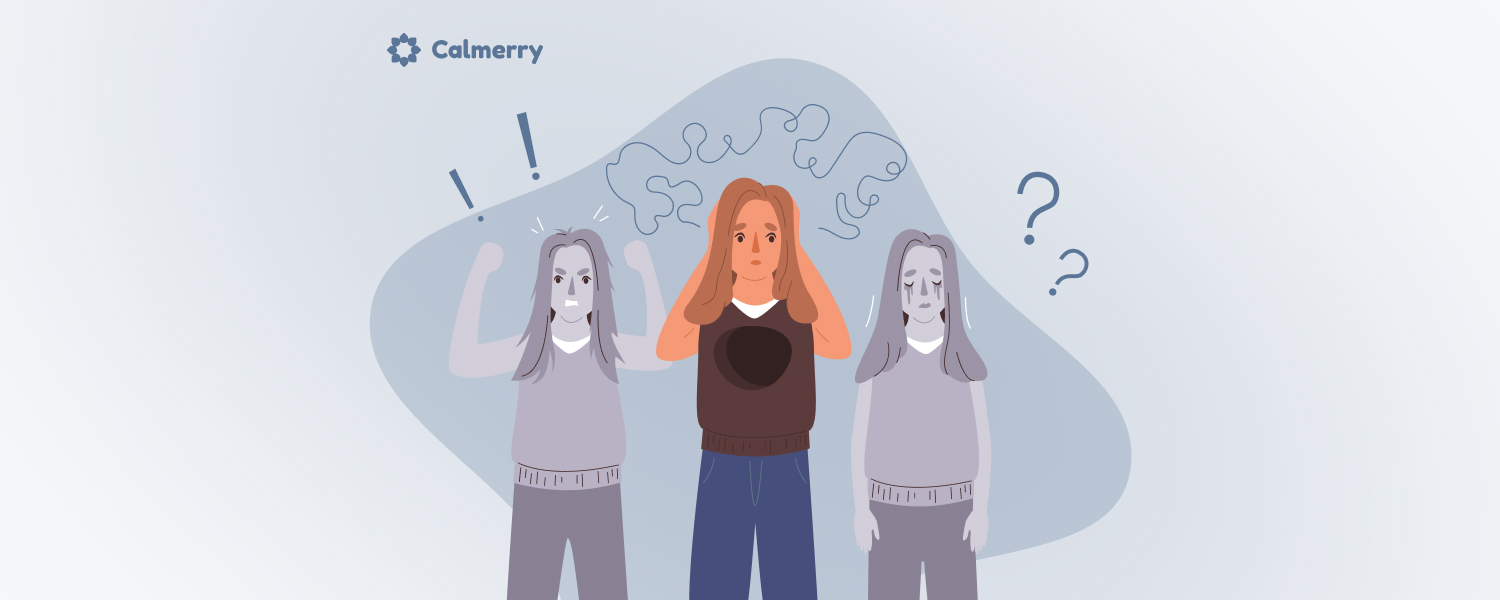Please note that results of this test cannot be considered a diagnosis. It can only help you predict if you need to see a mental health professional for further examinations.
OCD test online (quiz)

Get started
Get mental health tips and offers
Subscribe now for the latest well-being insights, helpful resources, exclusive offers, and strategies
OCD tests transcript
Find out if it's healthy habits or obsession
1
I experience unwanted and scary thoughts, images, or urges.
- A. Never
- B. Rarely
- C. Sometimes
- D. Often
- E. Very often
2
I try to get rid of these thoughts or urges by performing certain repetitive behaviors or special rituals.
- A. Never
- B. Rarely
- C. Sometimes
- D. Often
- E. Very often
3
I have the urge to check, count, clean, or “fix” things over and over again.
- A. Never
- B. Rarely
- C. Sometimes
- D. Often
- E. Very often
4
I feel the need to perform these repetitive behaviors or rituals to feel less anxious or to prevent something bad from happening to myself or others.
- A. Never
- B. Rarely
- C. Sometimes
- D. Often
- E. Very often
5
I have intense fear about doing something that’s out of character for me; for example, I’m afraid that I will hurt a loved one even though I’m not a violent person.
- A. Never
- B. Rarely
- C. Sometimes
- D. Often
- E. Very often
6
I feel like I can’t control these unwanted thoughts or the repetitive behaviors, no matter how hard I try.
- A. Never
- B. Rarely
- C. Sometimes
- D. Often
- E. Very often
7
Dealing with these unwanted thoughts and behaviors consumes significant time (more than 1 hour per day) and interferes with my daily life and functioning.
- A. Never
- B. Rarely
- C. Sometimes
- D. Often
- E. Very often
8
I recognize that, logically, my repetitive thoughts and behaviors are excessive or unreasonable. But I still can’t stop them.
- A. Never
- B. Rarely
- C. Sometimes
- D. Often
- E. Very often
9
I avoid certain places, situations, or objects that trigger these scary thoughts or urges.
- A. Never
- B. Rarely
- C. Sometimes
- D. Often
- E. Very often
10
My repetitive thoughts and behaviors cause me significant distress and affect my social, occupational, or other important areas of functioning (for example, work or my relationships).
- A. Never
- B. Rarely
- C. Sometimes
- D. Often
- E. Very often
11
How strong is the drive to perform compulsions (repetitive behaviors or rituals) when the urge comes on?
- A. Not very strong; I have complete control over the urge.
- B. I feel some pressure to do compulsions, but I can usually resist the urge.
- C. I feel a lot of pressure to do compulsions, and it takes a lot out of me to resist them.
- D. I feel an intense need to do compulsions, but I can sometimes delay myself from doing them for a while.
- E. I have no control over my compulsions; the urge is overpowering.
12
How would you feel if you had a scary intrusive thought and you were prevented from doing your compulsions?
- A. I would be fine with it.
- B. I would feel only a little bit anxious.
- C. I would be anxious, but I could handle it.
- D. I would be very anxious.
- E. My anxiety would be debilitating.
Transcript results for OCD tests
Learn how to interpret your OCD test results and discuss them with a licensed mental health professional
You've got 0/68
The higher your score on this test, the more it might indicate a likelihood of meeting the criteria for an OCD diagnosis.
This test is not a definitive diagnosis. We strongly encourage you to share your results with a licensed healthcare provider. Only a professional can provide a comprehensive assessment and offer more insights into your symptoms.
If OCD is a part of your life, a therapist can play a crucial role. They provide a safe, non-judgmental space to explore your experiences and develop effective tools to manage your symptoms.
This test is not a definitive diagnosis. We strongly encourage you to share your results with a licensed healthcare provider. Only a professional can provide a comprehensive assessment and offer more insights into your symptoms.
If OCD is a part of your life, a therapist can play a crucial role. They provide a safe, non-judgmental space to explore your experiences and develop effective tools to manage your symptoms.
Calmerry mental health services
Personalized online therapy
Choose video, messaging, or both to fit your schedule and comfort. Get matched with your therapist within 1 hour.
Text therapy
Chat with a counselor who understands. Your help is just one message away.
FAQ OCD test
What causes OCD?
What are the most common ocd symptoms?
What are the different types of ocd?
How accurate is this ocd test for adults?
Is this online ocd quiz free and easy to access?
Can I take the OCD test online from home?
Is my personal data private and secure here?
How do doctors usually diagnose OCD?
How do Calmerry therapists approach OCD treatment?
What is the most effective treatment for OCD right now?
How can I help a loved one with OCD symptoms?
When should I be concerned that my symptoms might worsen?
For more information, please visit our FAQ






